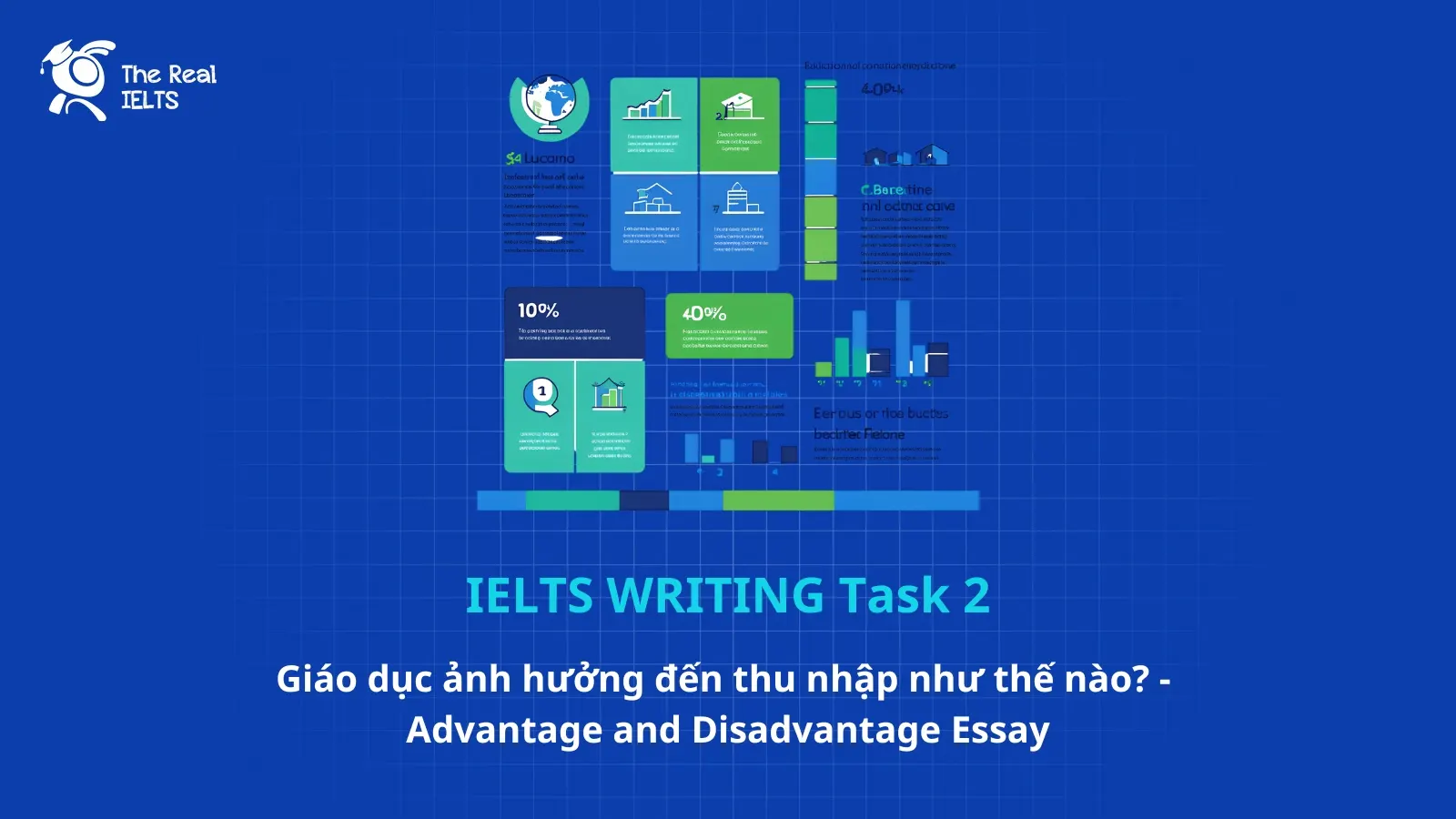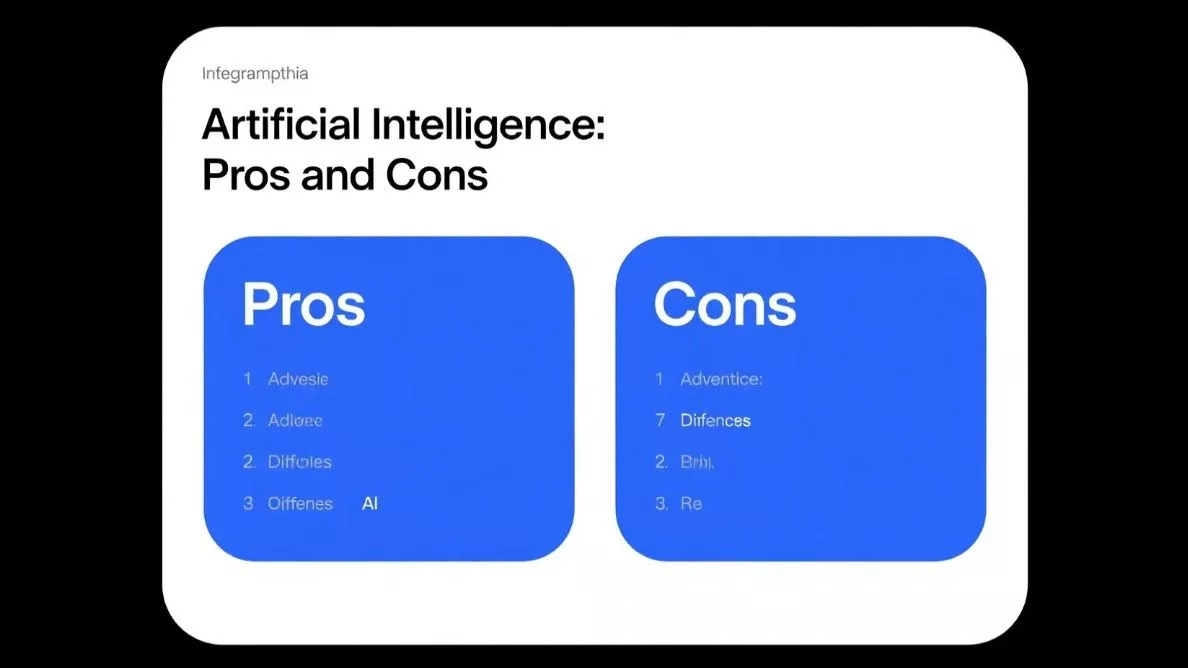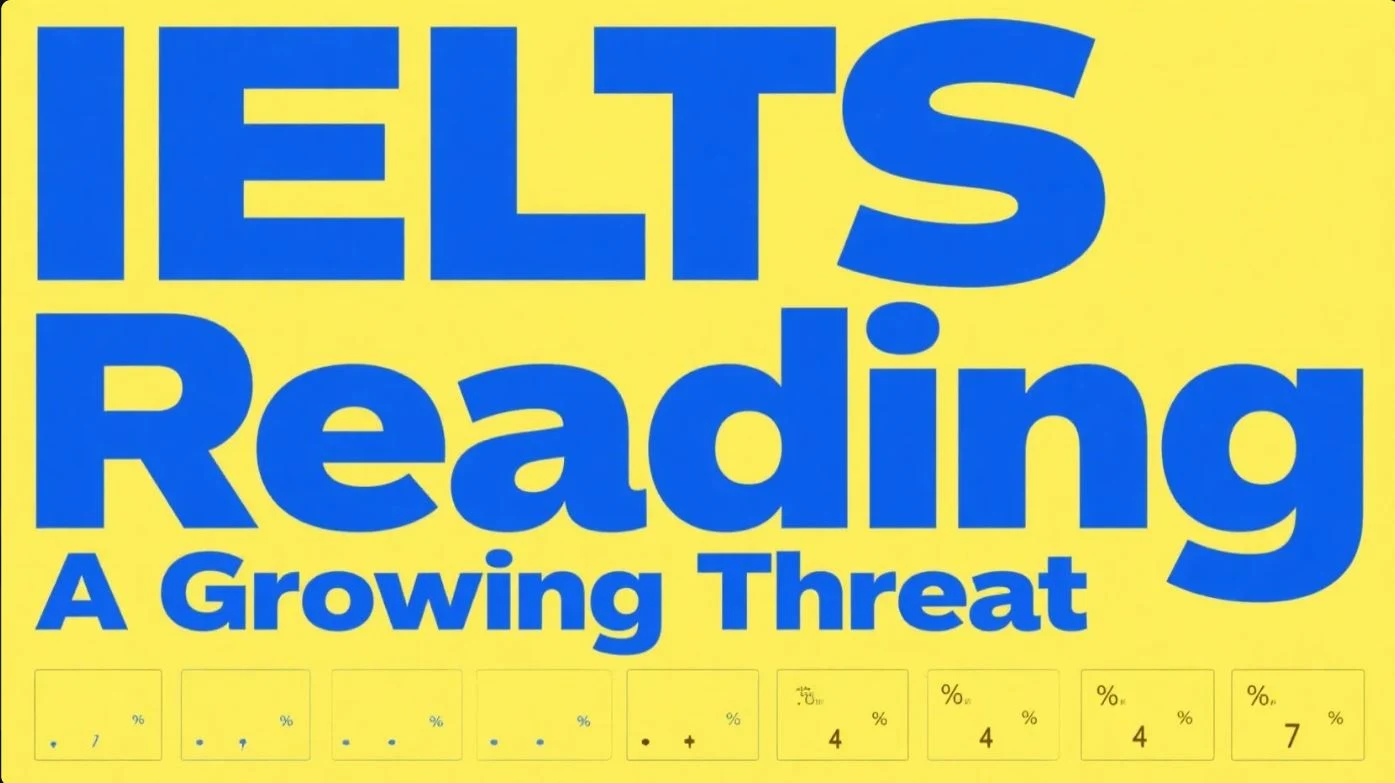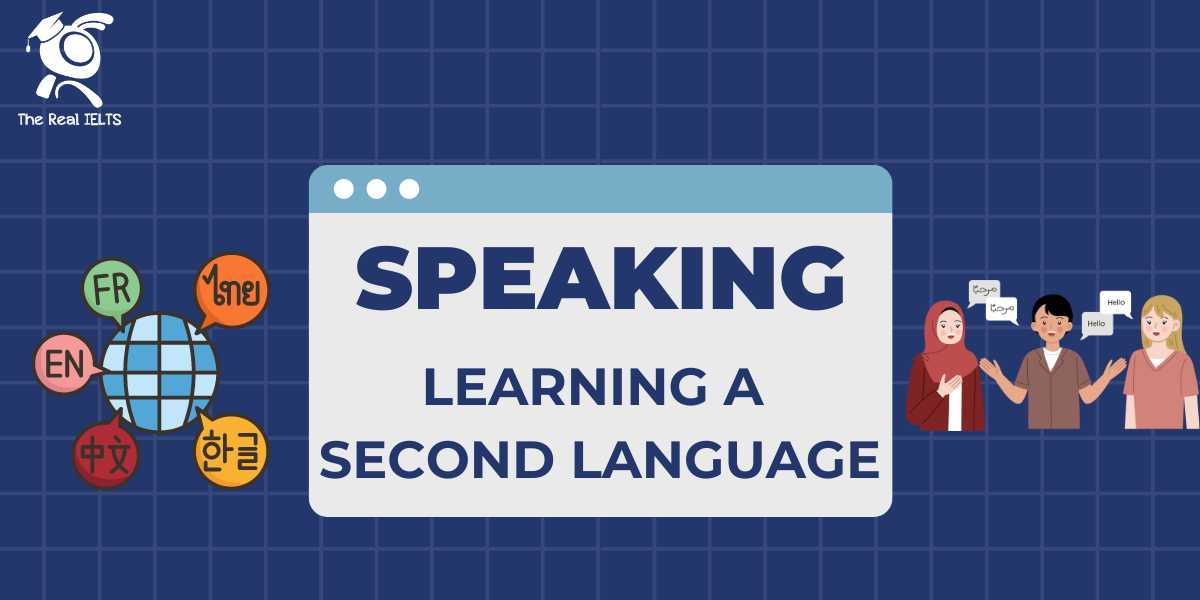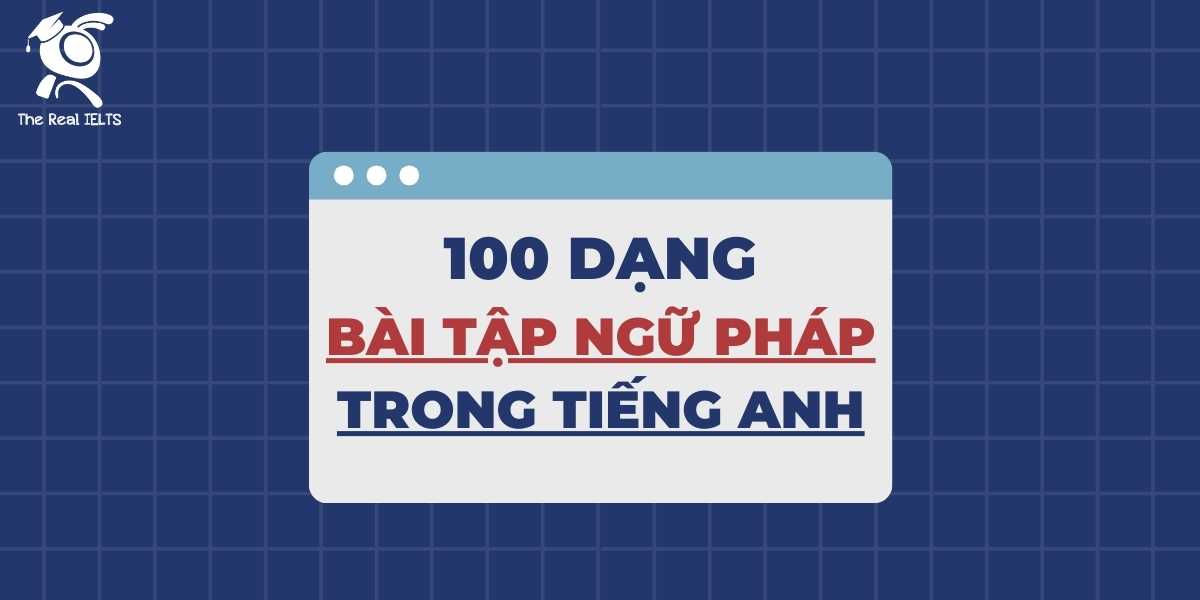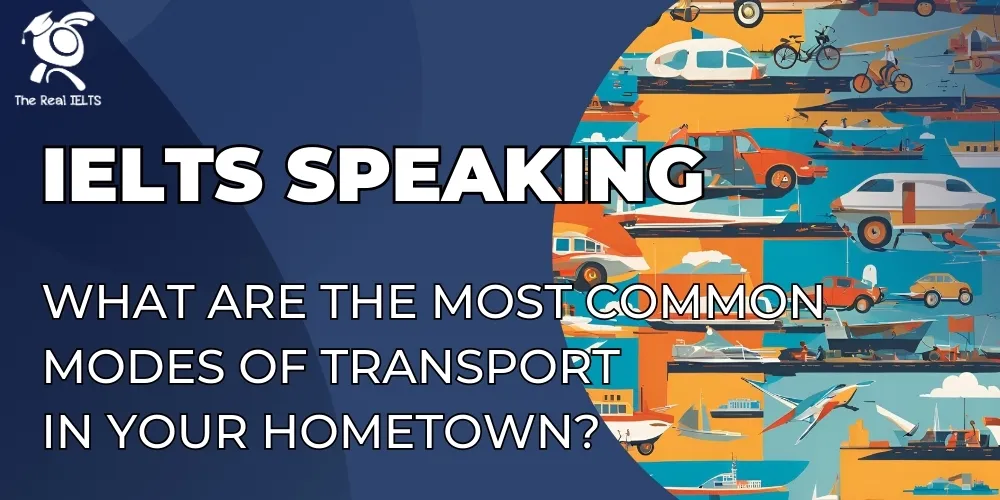Giáo dục có thể mang lại nhiều lợi ích về thu nhập, nhưng cũng tồn tại một số hạn chế. Trong bài IELTS Writing Task 2 dạng Advantage and Disadvantage Essay, thí sinh cần phân tích cả mặt tích cực và tiêu cực của việc học vấn đối với thu nhập, từ đó đưa ra lập luận logic và thuyết phục.
Đọc thêm: IELTS Writing Task 2: Giáo dục ảnh hưởng đến thu nhập như thế nào? – Discussion Essay.
Đề bài IELTS Writing Task 2: Giáo dục ảnh hưởng đến thu nhập như thế nào? – Advantage and Disadvantage Essay
Many studies suggest a strong correlation between education and income. What are the advantages and disadvantages of relying on education to achieve financial success?
Ví dụ 1
Many studies suggest a strong correlation between education and income, leading many to believe that obtaining higher education is the most effective path to financial success. However, while education offers significant advantages, it also comes with certain drawbacks. This essay will explore both the benefits and limitations of relying on education to achieve financial prosperity.
Advantages of Relying on Education for Financial Success
- Better Job Opportunities
Higher education provides individuals with specialized knowledge and qualifications, making them eligible for high-paying jobs in fields such as medicine, law, and engineering. Many employers prefer candidates with degrees because they are seen as more knowledgeable and capable. - Higher Earning Potential
Studies have consistently shown that individuals with higher education tend to earn more over their lifetimes compared to those without a degree. University graduates often start with higher salaries and have better chances of career advancement. - Job Stability and Benefits
Many professions that require higher education offer more job security and additional benefits such as health insurance, retirement plans, and paid leave. This financial stability can contribute to long-term wealth accumulation. - Networking and Career Growth
Universities and colleges provide students with opportunities to network with professionals, professors, and peers who can help them advance in their careers. Strong connections often lead to better job opportunities and higher salaries.
Disadvantages of Relying on Education for Financial Success
- High Cost of Education
One of the biggest drawbacks of pursuing higher education is the rising cost of tuition. Many graduates accumulate significant student loan debt, which can take years to repay and may reduce their financial freedom. - No Guarantee of Employment
A degree does not always guarantee a high-paying job. Many graduates struggle to find employment in their chosen fields due to job market saturation, economic downturns, or a lack of practical experience. - Limited Focus on Practical Skills
Traditional education systems often emphasize theoretical knowledge rather than hands-on skills. Many successful individuals, including entrepreneurs and skilled workers, achieve financial success through experience, vocational training, or self-employment rather than formal education. - Changing Job Market Demands
In today’s rapidly evolving job market, some high-paying careers do not require a university degree. Fields such as technology, digital marketing, and skilled trades offer lucrative opportunities based on skills and experience rather than formal education.
Conclusion
While education provides valuable knowledge, credentials, and networking opportunities, it is not the only path to financial success. The high cost of education and the evolving job market make it important for individuals to balance formal learning with practical experience and skill development. Therefore, while higher education can be a strong foundation for financial success, it should not be the sole factor in achieving long-term prosperity.
Ví dụ 2
Education has long been associated with higher income levels, leading many to believe that pursuing formal qualifications is the most reliable path to financial success. While this approach offers several advantages, it also has notable drawbacks. This essay will discuss both the benefits and limitations of relying on education as a means to achieve financial prosperity.
On the one hand, higher education provides individuals with specialized knowledge and credentials that can significantly enhance job opportunities. Many high-paying professions, such as medicine, law, and engineering, require formal degrees, making education an essential gateway to lucrative careers. Furthermore, universities and colleges help students develop critical thinking, problem-solving, and communication skills, which are highly valued in the job market. Another advantage is that degree holders generally experience greater job stability, as employers often prioritize candidates with formal qualifications over those without. Statistical data consistently show that individuals with higher education tend to earn more over their lifetimes compared to those with only a high school diploma.
On the other hand, relying solely on education to achieve financial success has several disadvantages. Firstly, obtaining a degree can be expensive and time-consuming, with no guarantee of securing a high-paying job afterward. Many graduates struggle with student loan debt while facing an increasingly competitive job market where academic qualifications alone are insufficient. Secondly, practical skills and experience are often more valuable than degrees in certain industries. Careers in technology, creative fields, and entrepreneurship frequently reward talent, innovation, and hands-on expertise rather than formal education. Additionally, rapid changes in the job market mean that some degrees may become obsolete, leaving graduates unprepared for emerging career opportunities.
In conclusion, while education offers numerous advantages in terms of career opportunities and financial stability, it is not a foolproof path to success. Individuals should complement their formal education with practical skills, experience, and adaptability to maximize their earning potential in an ever-changing job market.
Estimated Band Score: 8.0+
- Task Response: Balanced discussion of both advantages and disadvantages.
- Coherence & Cohesion: Well-structured with clear progression of ideas.
- Lexical Resource: Strong vocabulary with precise word choices.
- Grammatical Range & Accuracy: Varied sentence structures with minimal errors.
Ví dụ 3
Many studies suggest a strong correlation between education and income, leading to the belief that higher education is a key pathway to financial success. However, relying solely on education has both advantages and disadvantages. This essay will explore both perspectives.
Advantages of Relying on Education for Financial Success
- Higher Earning Potential:
- Research consistently shows that individuals with higher levels of education tend to earn more over their lifetime compared to those with lower levels of education.
- Certain fields, such as medicine, law, and engineering, require formal education and offer lucrative salaries.
- Better Job Opportunities:
- A degree can increase employability and open doors to a wider range of job options, particularly in industries where qualifications are mandatory.
- Many companies require degrees as a basic criterion for hiring.
- Career Advancement and Stability:
- Higher education often leads to career growth, promotions, and job security.
- Those with degrees are less likely to experience long-term unemployment.
- Personal and Professional Development:
- Education enhances critical thinking, problem-solving, and communication skills, which are valuable in any profession.
- University education provides networking opportunities that can lead to better career prospects.
Disadvantages of Relying on Education for Financial Success
- High Cost of Education:
- University tuition fees can be expensive, and student loan debt can delay financial independence.
- The return on investment is not guaranteed, especially if salaries do not compensate for education costs.
- No Guarantee of Success:
- A degree does not automatically lead to high income; success also depends on industry demand, skills, and economic conditions.
- Some degree holders struggle with underemployment or low-paying jobs.
- Growing Importance of Skills and Experience:
- Many high-paying careers, such as those in technology, trades, and entrepreneurship, do not necessarily require formal education.
- Employers increasingly value practical skills, work experience, and adaptability over degrees.
- Time-Consuming:
- Higher education requires several years of study, delaying entry into the workforce.
- Some people achieve financial success earlier through alternative routes like vocational training, self-employment, or apprenticeships.
Conclusion
While education provides a strong foundation for financial success, relying solely on it has limitations. A balanced approach—combining education with practical experience, skills development, and adaptability—is the most effective strategy for long-term financial growth.
Ví dụ 4
Education is often seen as a pathway to financial success, with numerous studies highlighting a strong correlation between higher education and increased income levels. However, relying solely on education to achieve financial success has both advantages and disadvantages. This essay will explore both perspectives.
Advantages of Relying on Education for Financial Success
- Higher Earning Potential – Individuals with college degrees or advanced qualifications typically have access to higher-paying jobs compared to those with only a high school diploma.
- Job Security and Career Growth – Many industries prioritize candidates with formal education, offering them better job stability and opportunities for promotion.
- Specialized Knowledge and Skills – Higher education equips individuals with expertise in specific fields, such as medicine, law, or engineering, which are often associated with lucrative careers.
- Networking Opportunities – Universities provide valuable connections with professors, alumni, and industry leaders, increasing the chances of securing high-paying positions.
Disadvantages of Relying on Education for Financial Success
- High Costs and Student Debt – The rising cost of higher education can leave graduates burdened with significant debt, which may take years to repay and limit financial freedom.
- No Guaranteed Employment – A degree does not always ensure a well-paying job, especially in oversaturated job markets where competition is fierce.
- Importance of Practical Skills – Many employers prioritize hands-on experience, problem-solving abilities, and adaptability over formal education, making skills and work experience equally important.
- Alternative Routes to Success – Many successful individuals, such as entrepreneurs and skilled workers, achieve financial success without traditional higher education, proving that degrees are not the only path to wealth.
Conclusion
While education can provide valuable opportunities for financial success, it is not a guaranteed route to wealth. The high costs and job market realities mean that relying solely on education can be risky. A balanced approach that includes education, skill development, and real-world experience is often the most effective strategy for long-term financial success.
Ví dụ 5
Education is often seen as a pathway to financial success, with numerous studies showing a positive correlation between higher education levels and higher income. However, relying solely on education as a means to achieve financial stability has both advantages and disadvantages. This essay will examine both sides of the argument.
Advantages of Relying on Education for Financial Success
- Higher Earning Potential
Studies consistently show that individuals with higher education qualifications tend to earn more than those without. Degrees in high-demand fields such as medicine, law, engineering, and business often lead to well-paying careers. - Increased Job Opportunities
A formal education opens doors to a wider range of career options, many of which require a degree as a minimum qualification. Certain professions, particularly in specialized industries, are inaccessible without higher education. - Professional Development and Networking
Universities and colleges provide not only academic knowledge but also networking opportunities. Connections made during higher education can lead to job referrals, internships, and mentorship opportunities, which contribute to long-term financial success. - Development of Essential Skills
Education helps individuals develop critical thinking, communication, and problem-solving skills, all of which are valuable in the workplace. These transferable skills can increase employability and career growth.
Disadvantages of Relying on Education for Financial Success
- High Cost of Education and Student Debt
One of the major drawbacks of relying on higher education is the financial burden it creates. Tuition fees, student loans, and other associated costs can result in long-term debt, which may take years to repay, reducing the financial benefits of a degree. - No Guarantee of Employment or High Income
A degree does not guarantee financial success. Many graduates struggle to find jobs in their field or face underemployment, especially in industries with an oversupply of qualified candidates. - Practical Skills and Experience May Be More Valuable
In many industries, skills, experience, and adaptability are more important than formal education. Professions such as skilled trades, entrepreneurship, and the tech industry often value hands-on experience and self-learning over degrees. - Changing Job Market Trends
The job market is constantly evolving, and traditional degrees may not always keep up with industry demands. Many high-paying careers today (e.g., digital marketing, software development) prioritize skills and certifications over formal education.
Conclusion
While education can significantly improve financial prospects, it is not a guaranteed path to success. The cost of education, changing job market demands, and the importance of skills and experience must be considered. A balanced approach that combines formal education with practical skills, adaptability, and continuous learning is the most effective strategy for achieving financial success.
Ví dụ 6
Education is often seen as a key pathway to financial success, with numerous studies suggesting a strong correlation between higher education and increased income. However, while formal education provides many advantages, relying solely on it for financial success also has drawbacks. This essay will examine both the benefits and limitations of using education as a primary means to achieve financial prosperity.
Advantages of Relying on Education for Financial Success
- Higher Earning Potential – Research consistently shows that individuals with higher education degrees, particularly in specialized fields like medicine, law, and engineering, tend to earn more than those without a degree. A college or university education often leads to higher starting salaries and long-term financial stability.
- Better Job Opportunities – Many high-paying jobs require formal qualifications. Employers often prioritize candidates with degrees, making education a gateway to better career prospects, professional growth, and job security.
- Development of Valuable Skills – Higher education equips individuals with critical thinking, communication, problem-solving, and analytical skills, which are highly valued in the job market. These skills increase employability and career progression opportunities.
- Networking Opportunities – Universities and colleges provide environments for students to connect with professors, peers, and industry professionals. These networks can open doors to high-paying job opportunities and entrepreneurial ventures.
Disadvantages of Relying on Education for Financial Success
- High Cost and Student Debt – The rising cost of higher education can be a financial burden. Many graduates struggle with student loan debt, which can delay financial independence and wealth accumulation.
- Not All Degrees Lead to High Income – While some fields offer lucrative careers, others—such as humanities and arts—may not guarantee high salaries. Graduates from certain disciplines may face underemployment or job market saturation.
- Experience and Skills Can Be More Valuable – Many high-paying careers do not require formal education. Entrepreneurs, self-taught professionals, and skilled tradespeople often achieve financial success through experience, networking, and industry-specific certifications rather than traditional degrees.
- Changing Job Market Demands – The job market is constantly evolving, and some degrees may become obsolete. Employers increasingly value practical skills, adaptability, and real-world experience over formal education. Fields like technology and digital marketing prioritize hands-on expertise, making alternative education paths (such as coding boot camps and vocational training) viable options.
Conclusion
While education can be a strong foundation for financial success, relying solely on it has limitations. A balanced approach that includes gaining practical skills, work experience, and continuous learning is often more effective. In today’s dynamic economy, adaptability and real-world expertise are just as important as formal qualifications.
Ví dụ 7
Education is often considered a key factor in achieving financial success, as studies suggest a strong correlation between academic qualifications and income levels. However, relying solely on education has both advantages and disadvantages.
Advantages
- Higher Earning Potential – University graduates generally have access to better-paying jobs in fields such as medicine, law, and engineering. Many employers offer higher salaries to those with formal qualifications.
- Job Stability and Career Growth – Education often provides a structured career path with opportunities for promotions and job security. Many professional fields require degrees for long-term career progression.
- Access to Better Opportunities – A degree can open doors to prestigious institutions, networking opportunities, and specialized training, all of which enhance career prospects.
- Personal and Professional Development – Higher education fosters critical thinking, problem-solving, and communication skills, which are valuable in various industries.
Disadvantages
- High Cost and Student Debt – University education is expensive, and many graduates struggle with student loans, delaying financial stability.
- No Guarantee of Success – A degree does not always lead to high-paying jobs, as some graduates face underemployment or struggle in competitive job markets.
- Limited Practical Experience – Many academic programs focus on theoretical knowledge rather than hands-on skills, which employers often prioritize.
- Alternative Paths to Success – Many successful individuals achieve financial success through entrepreneurship, vocational training, or self-taught skills without formal education.
Conclusion
While education provides significant advantages for financial success, it is not the only path. Practical skills, experience, and adaptability are equally important in today’s evolving job market. A balanced approach that combines education with real-world expertise is often the most effective strategy.
Ví dụ 8
Many studies suggest a strong correlation between education and income, leading many to believe that formal education is the key to financial success. While obtaining a degree can provide several advantages, relying solely on education also has its drawbacks. This essay will discuss both the benefits and limitations of pursuing higher education as a path to financial prosperity.
Advantages of Relying on Education for Financial Success
One of the main advantages of formal education is that it enhances job opportunities. Many high-paying careers, such as medicine, law, and engineering, require specific academic qualifications. Employers often prefer candidates with degrees, as they demonstrate expertise, discipline, and commitment. Additionally, universities provide students with valuable networking opportunities, internships, and exposure to industry professionals, increasing their chances of securing well-paid jobs.
Another benefit is job stability and career progression. Higher education often leads to better job security, as professionals with specialized qualifications are in demand. Moreover, individuals with degrees may have better opportunities for promotions and salary increases, as employers tend to value educational credentials when considering career advancements.
Disadvantages of Relying on Education for Financial Success
Despite its advantages, depending solely on education for financial success has drawbacks. First, higher education can be expensive and time-consuming. Many students graduate with significant debt, which can take years to repay, delaying their ability to accumulate wealth. In contrast, some individuals who enter the workforce early or pursue vocational training may achieve financial independence sooner.
Additionally, a degree does not guarantee success. In today’s fast-changing job market, skills and practical experience are often more valuable than formal education. Many industries, such as technology and entrepreneurship, prioritize innovation and hands-on expertise over academic credentials. Some of the most successful business leaders and professionals have achieved financial success without completing traditional higher education.
Conclusion
While education can provide a strong foundation for financial success by improving job prospects and career stability, it is not the only determining factor. The high cost of education and the growing demand for practical skills mean that individuals should also focus on gaining relevant experience and developing marketable abilities. A balanced approach that combines education with skill development is the most effective strategy for achieving financial success.
Ví dụ 9
Many studies indicate a strong correlation between education and income, leading people to believe that higher education is a key pathway to financial success. While obtaining a formal degree offers numerous benefits, there are also potential drawbacks to relying solely on education for economic prosperity. This essay will examine both the advantages and disadvantages of this approach.
One major advantage of higher education is that it enhances job opportunities and earning potential. Many high-paying professions, such as medicine, engineering, and finance, require advanced qualifications that can only be obtained through formal education. Additionally, university graduates tend to have higher employment rates compared to those without a degree, as academic credentials provide a competitive edge in the job market. Furthermore, education equips individuals with critical thinking, problem-solving skills, and specialized knowledge, which are highly valued by employers and can lead to career advancement and financial stability.
However, there are also disadvantages to relying solely on education for financial success. First, higher education does not always guarantee high-paying jobs. Many graduates struggle with unemployment or underemployment due to job market saturation and the increasing demand for practical skills rather than academic knowledge. Second, obtaining a degree can be expensive, leaving many students burdened with significant debt that takes years to repay. Finally, in some industries, practical skills and work experience are more valuable than formal education. For instance, successful entrepreneurs, skilled tradespeople, and self-taught professionals can achieve financial success without a university degree, highlighting alternative paths to wealth.
In conclusion, while education provides valuable knowledge and improves job prospects, it is not a guaranteed route to financial success. A balanced approach that includes practical experience, skills development, and adaptability is crucial for long-term economic stability.


